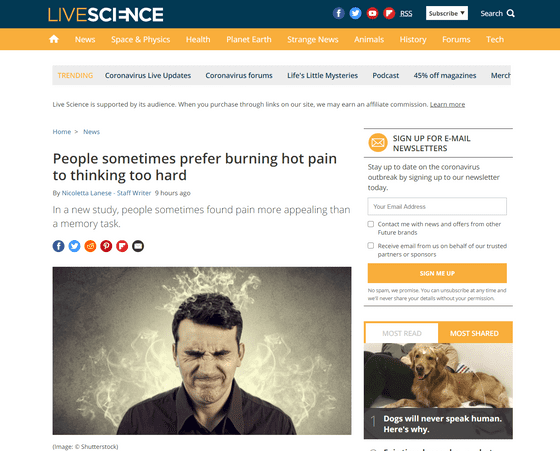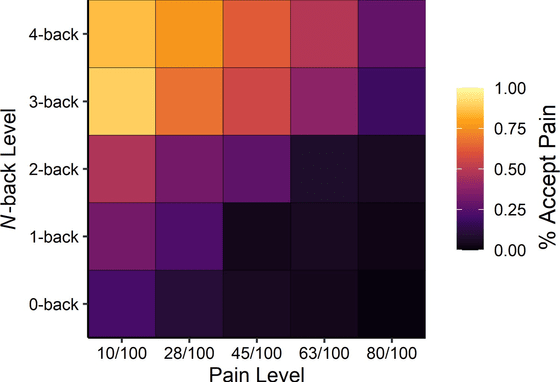It turns out that humans think that 'physical pain is better' than tackling difficult problems

It is painful for everyone to be bothered by difficult problems. An experiment conducted by a psychologist that allowed subjects to choose between 'unpleasant pain' and a 'memory test' revealed that 'people see cognitive effort and physical distress as a trade-off.'
Forced choices reveal a trade-off between cognitive effort and physical pain | eLife
People sometimes prefer burning hot pain to thinking too hard | Live Science
https://www.livescience.com/mental-effort-physical-pain-trade-off.html

A research team led by Todd Vogel, a PhD student at McGill University's Faculty of Psychology, volunteers 39 McGill University students to investigate the tendency of humans to avoid tackling cognitive tasks. And conducted an experiment. The male-female ratio of the subjects was 10:29, and the average age was 21.4 years.
For the subjects collected for the experiment, the research team first attached a 9 cm square meter heat stimulation pad to the arm to raise the temperature of the pad to 45 to 49 degrees, and the intensity of pain received from each temperature was 0. I had it evaluated by ~ 100. After that, the characters were displayed one by one on the monitor of the PC in succession, and a memory test was conducted to answer 'Is the character displayed twice before and the character currently displayed the same?'. The purpose of this was to grasp individual differences in pain sensitivity and memory, and to equalize 'intensity of pain' and 'difficulty of cognitive tasks'.
After that, the research team conducted an experiment in which subjects wearing a thermal stimulation pad were asked to perform a memory test again and to choose 'whether to challenge the memory test or experience pain'. In the experiment, the task of 'remembering the character displayed before 〇' was changed from 0 to 4 before, and the difficulty level of the memory test was changed to 5 levels. In addition, in '0 before', the subject did not have to remember the previously displayed character, but simply answered whether the currently displayed character was 'X'.
Subjects could also choose to suffer pain instead of passing the memory test, but continued pain levels increased to up to 5 levels.
The following is a heat map of the results of the experiment, which means that the lighter the color, the higher the percentage of subjects choosing pain. For example, the brightly colored squares in the upper left of the figure mean that 'most subjects chose to suffer if the memory test was difficult and the level of distress was low.' Conversely, the dark squares in the lower right corner of the figure mean that 'most subjects chose to challenge the memory test if the test was easy and the level of pain was high.'

Throughout the experiment, subjects had a 28% chance of choosing distress. Also, only one in 39 subjects categorically chose to take the memory test without choosing pain.
The research team commented on the results of the experiment: 'As the level of pain given increases, subjects are more likely to challenge cognitive efforts. The results of this experiment show that humans engage in cognitive efforts. It reinforces the previous belief that there is a tendency to avoid
The research team also measured the time it took for the subject to choose between the test and the pain, but he said that choosing to challenge the test was relatively less time consuming. On the other hand, there was a moment of hesitation when choosing pain.
'Avoiding pain may be a more fundamental issue than avoiding cognitive efforts, for example, when you withdraw your hand from a hot stove, you don't wonder if you should do it,' Vogel said. I commented.

In addition, the experiment in which pain and difficult problems are selected seems to be torture from the perspective, but the content of the experiment is said to have been approved by the Research Ethics Committee of McGill University. In addition, the subjects are asked to sign the consent form after explaining the contents of the experiment in advance, and the subjects are rewarded for participating in the experiment with credits for the psychology course of the same university or an hourly wage of C $ 15 (about 1200 yen). I received either.
Vogel told Live Science, a science news site, 'Does the tendency to prefer cognitive efforts or distress differ between healthy people and those with chronic pain, depression, or mood disorders? I'm also interested in some experiments. '
Related Posts:
in Science, Posted by log1l_ks







